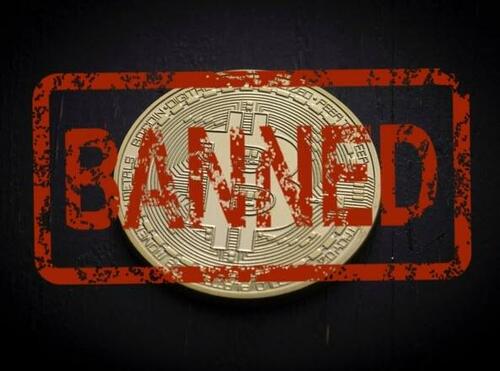
Authored by Nick Giambruno via InternationalMan.com,
Recently, we’ve heard powerful bankers and politicians expressing their desire to ban Bitcoin.
The notion that the US government will ban Bitcoin is popular for a good reason.
Bitcoin threatens a significant source of the government’s power—the power to create fake money out of thin air and force everyone to use it.
That’s because Bitcoin can give monetary sovereignty to the individual and render central banks obsolete—along with their confetti currencies.
That’s no small accomplishment.
It’s a historical development that profoundly alters the status quo between the rulers and the ruled. It’s similar to the invention of gunpowder, the printing press, and the Internet.
There’s no question the US government would want to protect their racket from an encroaching monetary competitor in the same way the mafia does when a rival encroaches on their turf.
The $64,000 question is whether they’ll be successful.
Friedrich Hayek, the great free-market Austrian economist, once said:
“I don’t believe we shall ever have a good money again before we take the thing out of the hands of government, that is, we can’t take it violently out of the hands of government, all we can do is by some sly roundabout way introduce something that they can’t stop.”
Hayek is right.
By their very nature, governments never peacefully relinquish power. And if forcefully taking power out of their hands is out of the question, then the only way to do it is through “some sly, roundabout way introduce something they can’t stop.”
Is Bitcoin that solution?
Many people think the answer is “no” because the government will shut it down.
Can Anyone Shut Bitcoin Down?
Bitcoin has no central authority and no single point of failure.
Instead, it runs on a decentralized, voluntary, and growing worldwide network of over 17,300 computers in nearly 100 countries.
Any desktop, laptop, Raspberry Pi—and even some cell phones—have the potential to run the full Bitcoin software. Furthermore, as technology advances, running Bitcoin will become even more widespread.
Many of these computers are cleverly hidden with Tor, which stands for “The Onion Router.” It encrypts your internet traffic and then hides it by bouncing through a series of computers worldwide to obfuscate your IP address and physical location.
In any case, with Bitcoin, there’s no central location for a SWAT team to raid. There’s no CEO to arrest. The best that governments can do is play an endless game of global whack-a-mole.
Even if the US and Russia engaged in an all-out nuclear war, destroying most of the Northern Hemisphere, Bitcoin wouldn’t miss a beat in the Southern Hemisphere.
To even have a chance to stop Bitcoin, every government in the world would have to successfully coordinate simultaneously to shut down the entire Internet everywhere and then keep it off forever.
Even in that improbable scenario, the Bitcoin network can be communicated over radio signals and mesh networks. At the same time, small portable solar panels can power the computers running the network if the regular grid is unavailable.
Further, a network of satellites is constantly beaming the Bitcoin network down to Earth.
In short, all aspects of Bitcoin are genuinely decentralized and robust.
Barring an inescapable, global return to the Stone Age, Bitcoin appears unstoppable.
The cat is out of the bag. Bitcoin is bigger than any government.
If They Can’t Shut It Down, Won’t They Ban It?
Many countries have already tried to ban Bitcoin.
Algeria, Bangladesh, Bolivia, Ecuador, Egypt, India, Iran, Kyrgyzstan, Morocco, Nepal, Nigeria, Saudi Arabia, Thailand, Turkey, and numerous others have tried to ban Bitcoin. However, they all failed miserably as adoption in those countries kept rising.
Even the mighty Chinese government has banned Bitcoin numerous times with little to no long-term effects. Bitcoin didn’t just survive an attack by a global superpower but emerged stronger and more resilient than ever.
Despite all of this, could the US government still try to outlaw Bitcoin?
It is certainly possible that the US President could issue an Executive Order banning Bitcoin. Remember, Executive Order 6102 outlawed gold ownership for American citizens from 1933 until it was repealed in 1974.
However, that outcome is unlikely for four reasons.
Reason #1: Code Is Protected Speech
Bitcoin is simply open-source computer code that is available to anyone.
In the Bernstein v. the US Department of State case, US federal courts have ruled that computer code is equivalent to speech protected by the 1st Amendment of the US Constitution.
On the other hand, the Constitution is not a reliable protector of rights, as the Covid hysteria, the War on Terror, and the War on Drugs have all proven. So, I wouldn’t exclusively count on the US Constitution to protect Bitcoin.
Nonetheless, the previous strong precedents ruling code as equivalent to protected speech complicates any attempts to ban it.
Reason #2: Regulatory Clarity Already Exists
Given their statements, it’s clear that the Securities and Exchange Commission (SEC) views almost all cryptocurrencies as unregistered securities, making them vulnerable to enforcement actions.
That has led many to incorrectly believe that the SEC will go after Bitcoin.
The reality is that Bitcoin is the only cryptocurrency that is unambiguously NOT a security.
The US government has been clear that it views Bitcoin as a commodity—a much more favorable designation—under the purview of the Commodity Futures Trading Commission (CFTC) and the Commodity Exchange Act.
Bitcoin is a commodity because it is an asset without an issuer.
Similarly, gold, silver, copper, wheat, corn, and other commodities have producers but do not have issuers.
Every other cryptocurrency other than Bitcoin has an issuer. They also have identifiable founders, central foundations, marketing teams, and insiders who can exercise undue control.
On the other hand, Bitcoin has none of these things—just as copper or nickel has no marketing department or founder.
The SEC couldn’t go after Bitcoin even if it wanted to because there’s nobody to go after. There’s no Bitcoin headquarters. Bitcoin has no CEO, no marketing department, and no employees.
But presuming the SEC could go after Bitcoin, they won’t because even they admit Bitcoin is not a security and thus not under their purview.
Here’s the bottom line.
The IRS, the SEC, the CFTC, and other federal agencies have already given Bitcoin clear regulatory and tax frameworks.
That’s helped many large US businesses, including many large financial institutions, get into Bitcoin. Reversing these guidelines, which have been established for many years, and banning Bitcoin would generate significant pushback and be challenging.
Reason #3: Banning Bitcoin Is Impractical
Government bans may restrict something, but they cannot make something valuable and desired by many people go away by passing a law.
Consider governments in Argentina, Venezuela, and numerous other countries with laws restricting citizens from accessing US dollars.
However, these laws have little effect on their citizens’ desire and ability to use them. Instead, these actions create a thriving black market or, more accurately, a free market.
Similarly, consider how successful governments have been in prohibiting cannabis over the decades. Despite their best efforts, cannabis has always been available in most big cities.
Trying to enforce a prohibition on something digital and borderless like Bitcoin is entirely impractical. Bitcoin would be far more challenging for governments to ban than US dollars or a plant.
Further, many popular Bitcoin wallets use a 12-word phrase as a way to recover your funds. If you can memorize the 12-word phrase, you can potentially store billions of dollars worth of value just in your head with nothing else.
Try banning that.
It’s like trying to ban mathematics.
Even if it were practical to ban Bitcoin, it’s already too late.
There’s a critical mass of Bitcoin advocates among large corporations, politicians, and regular people.
They bring all of their lawyers, lobbyists, and political connections to advocate for Bitcoin potentially. That’s a lot of political firepower. And their numbers are only growing.
According to a survey from NYDIG, 46 million Americans own Bitcoin. That’s around 22% of all adults in the US.
Supporting a ban on Bitcoin means going against tens of millions of Americans—many of whom are wealthy, powerful, and well-connected.
In short, outlawing Bitcoin will not help anyone win an election.
Bitcoin has already reached escape velocity. In other words, it’s too politically popular to outlaw, and every day, it gets stronger as adoption grows.
Reason #4: Banning Bitcoin Will Benefit US Rivals
If the US government was foolish enough to ban Bitcoin despite all of this, it would only give Russia, China, and its other rivals a golden opportunity to be at the forefront of a lucrative new industry and the future of money.
Banning Bitcoin would be a financial and geopolitical blunder of the highest order.
The Bottom Line
The US government doesn’t like Bitcoin.
Even though banning it would be politically unpopular and unconstitutional, it still might consider the move if it could do so effectively without giving an edge to its rivals.
But it can’t, so it won’t.
So, I think the US government will have to adapt to that reality, and it already has been by giving Bitcoin a clear regulatory framework for businesses and investors.
When you put it all together, you have an unstoppable superior form of money conquering the world.
It’s not hard to see where this trend is going. It’s a monetary revolution.
Yet, many people still believe the government will shut Bitcoin down or otherwise ban it.
That perception gap is a blessing, allowing us to capitalize on this information asymmetry with investments that tap into this powerful trend.
However, the opportunity could be gone soon.
Historically, Bitcoin’s biggest moves to the upside happen very quickly… especially amid a financial crisis.
With multiple crises unfolding right now, the next big move could happen imminently.
That’s why I just released an urgent PDF report, it’s called: The Most Dangerous Economic Crisis in 100 Years… the Top 3 Strategies You Need Right Now. It details how it could all unfold soon… and what you can do about it. Click here to download the PDF now.
Authored by Nick Giambruno via InternationalMan.com,
Recently, we’ve heard powerful bankers and politicians expressing their desire to ban Bitcoin.
The notion that the US government will ban Bitcoin is popular for a good reason.
Bitcoin threatens a significant source of the government’s power—the power to create fake money out of thin air and force everyone to use it.
That’s because Bitcoin can give monetary sovereignty to the individual and render central banks obsolete—along with their confetti currencies.
That’s no small accomplishment.
It’s a historical development that profoundly alters the status quo between the rulers and the ruled. It’s similar to the invention of gunpowder, the printing press, and the Internet.
There’s no question the US government would want to protect their racket from an encroaching monetary competitor in the same way the mafia does when a rival encroaches on their turf.
The $64,000 question is whether they’ll be successful.
Friedrich Hayek, the great free-market Austrian economist, once said:
“I don’t believe we shall ever have a good money again before we take the thing out of the hands of government, that is, we can’t take it violently out of the hands of government, all we can do is by some sly roundabout way introduce something that they can’t stop.”
Hayek is right.
By their very nature, governments never peacefully relinquish power. And if forcefully taking power out of their hands is out of the question, then the only way to do it is through “some sly, roundabout way introduce something they can’t stop.”
Is Bitcoin that solution?
Many people think the answer is “no” because the government will shut it down.
Can Anyone Shut Bitcoin Down?
Bitcoin has no central authority and no single point of failure.
Instead, it runs on a decentralized, voluntary, and growing worldwide network of over 17,300 computers in nearly 100 countries.
Any desktop, laptop, Raspberry Pi—and even some cell phones—have the potential to run the full Bitcoin software. Furthermore, as technology advances, running Bitcoin will become even more widespread.
Many of these computers are cleverly hidden with Tor, which stands for “The Onion Router.” It encrypts your internet traffic and then hides it by bouncing through a series of computers worldwide to obfuscate your IP address and physical location.
In any case, with Bitcoin, there’s no central location for a SWAT team to raid. There’s no CEO to arrest. The best that governments can do is play an endless game of global whack-a-mole.
Even if the US and Russia engaged in an all-out nuclear war, destroying most of the Northern Hemisphere, Bitcoin wouldn’t miss a beat in the Southern Hemisphere.
To even have a chance to stop Bitcoin, every government in the world would have to successfully coordinate simultaneously to shut down the entire Internet everywhere and then keep it off forever.
Even in that improbable scenario, the Bitcoin network can be communicated over radio signals and mesh networks. At the same time, small portable solar panels can power the computers running the network if the regular grid is unavailable.
Further, a network of satellites is constantly beaming the Bitcoin network down to Earth.
In short, all aspects of Bitcoin are genuinely decentralized and robust.
Barring an inescapable, global return to the Stone Age, Bitcoin appears unstoppable.
The cat is out of the bag. Bitcoin is bigger than any government.
If They Can’t Shut It Down, Won’t They Ban It?
Many countries have already tried to ban Bitcoin.
Algeria, Bangladesh, Bolivia, Ecuador, Egypt, India, Iran, Kyrgyzstan, Morocco, Nepal, Nigeria, Saudi Arabia, Thailand, Turkey, and numerous others have tried to ban Bitcoin. However, they all failed miserably as adoption in those countries kept rising.
Even the mighty Chinese government has banned Bitcoin numerous times with little to no long-term effects. Bitcoin didn’t just survive an attack by a global superpower but emerged stronger and more resilient than ever.
Despite all of this, could the US government still try to outlaw Bitcoin?
It is certainly possible that the US President could issue an Executive Order banning Bitcoin. Remember, Executive Order 6102 outlawed gold ownership for American citizens from 1933 until it was repealed in 1974.
However, that outcome is unlikely for four reasons.
Reason #1: Code Is Protected Speech
Bitcoin is simply open-source computer code that is available to anyone.
In the Bernstein v. the US Department of State case, US federal courts have ruled that computer code is equivalent to speech protected by the 1st Amendment of the US Constitution.
On the other hand, the Constitution is not a reliable protector of rights, as the Covid hysteria, the War on Terror, and the War on Drugs have all proven. So, I wouldn’t exclusively count on the US Constitution to protect Bitcoin.
Nonetheless, the previous strong precedents ruling code as equivalent to protected speech complicates any attempts to ban it.
Reason #2: Regulatory Clarity Already Exists
Given their statements, it’s clear that the Securities and Exchange Commission (SEC) views almost all cryptocurrencies as unregistered securities, making them vulnerable to enforcement actions.
That has led many to incorrectly believe that the SEC will go after Bitcoin.
The reality is that Bitcoin is the only cryptocurrency that is unambiguously NOT a security.
The US government has been clear that it views Bitcoin as a commodity—a much more favorable designation—under the purview of the Commodity Futures Trading Commission (CFTC) and the Commodity Exchange Act.
Bitcoin is a commodity because it is an asset without an issuer.
Similarly, gold, silver, copper, wheat, corn, and other commodities have producers but do not have issuers.
Every other cryptocurrency other than Bitcoin has an issuer. They also have identifiable founders, central foundations, marketing teams, and insiders who can exercise undue control.
On the other hand, Bitcoin has none of these things—just as copper or nickel has no marketing department or founder.
The SEC couldn’t go after Bitcoin even if it wanted to because there’s nobody to go after. There’s no Bitcoin headquarters. Bitcoin has no CEO, no marketing department, and no employees.
But presuming the SEC could go after Bitcoin, they won’t because even they admit Bitcoin is not a security and thus not under their purview.
Here’s the bottom line.
The IRS, the SEC, the CFTC, and other federal agencies have already given Bitcoin clear regulatory and tax frameworks.
That’s helped many large US businesses, including many large financial institutions, get into Bitcoin. Reversing these guidelines, which have been established for many years, and banning Bitcoin would generate significant pushback and be challenging.
Reason #3: Banning Bitcoin Is Impractical
Government bans may restrict something, but they cannot make something valuable and desired by many people go away by passing a law.
Consider governments in Argentina, Venezuela, and numerous other countries with laws restricting citizens from accessing US dollars.
However, these laws have little effect on their citizens’ desire and ability to use them. Instead, these actions create a thriving black market or, more accurately, a free market.
Similarly, consider how successful governments have been in prohibiting cannabis over the decades. Despite their best efforts, cannabis has always been available in most big cities.
Trying to enforce a prohibition on something digital and borderless like Bitcoin is entirely impractical. Bitcoin would be far more challenging for governments to ban than US dollars or a plant.
Further, many popular Bitcoin wallets use a 12-word phrase as a way to recover your funds. If you can memorize the 12-word phrase, you can potentially store billions of dollars worth of value just in your head with nothing else.
Try banning that.
It’s like trying to ban mathematics.
Even if it were practical to ban Bitcoin, it’s already too late.
There’s a critical mass of Bitcoin advocates among large corporations, politicians, and regular people.
They bring all of their lawyers, lobbyists, and political connections to advocate for Bitcoin potentially. That’s a lot of political firepower. And their numbers are only growing.
According to a survey from NYDIG, 46 million Americans own Bitcoin. That’s around 22% of all adults in the US.
Supporting a ban on Bitcoin means going against tens of millions of Americans—many of whom are wealthy, powerful, and well-connected.
In short, outlawing Bitcoin will not help anyone win an election.
Bitcoin has already reached escape velocity. In other words, it’s too politically popular to outlaw, and every day, it gets stronger as adoption grows.
Reason #4: Banning Bitcoin Will Benefit US Rivals
If the US government was foolish enough to ban Bitcoin despite all of this, it would only give Russia, China, and its other rivals a golden opportunity to be at the forefront of a lucrative new industry and the future of money.
Banning Bitcoin would be a financial and geopolitical blunder of the highest order.
The Bottom Line
The US government doesn’t like Bitcoin.
Even though banning it would be politically unpopular and unconstitutional, it still might consider the move if it could do so effectively without giving an edge to its rivals.
But it can’t, so it won’t.
So, I think the US government will have to adapt to that reality, and it already has been by giving Bitcoin a clear regulatory framework for businesses and investors.
When you put it all together, you have an unstoppable superior form of money conquering the world.
It’s not hard to see where this trend is going. It’s a monetary revolution.
Yet, many people still believe the government will shut Bitcoin down or otherwise ban it.
That perception gap is a blessing, allowing us to capitalize on this information asymmetry with investments that tap into this powerful trend.
However, the opportunity could be gone soon.
Historically, Bitcoin’s biggest moves to the upside happen very quickly… especially amid a financial crisis.
With multiple crises unfolding right now, the next big move could happen imminently.
That’s why I just released an urgent PDF report, it’s called: The Most Dangerous Economic Crisis in 100 Years… the Top 3 Strategies You Need Right Now. It details how it could all unfold soon… and what you can do about it. Click here to download the PDF now.
Loading…





